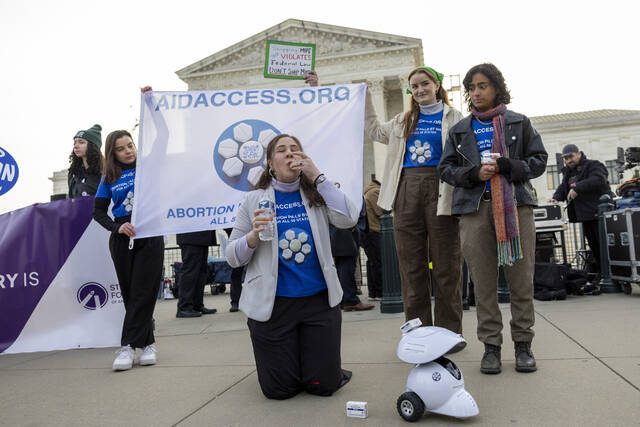The Supreme Court is likely to maintain access to a drug that was used in almost two-thirds of all abortions in the U.S. last year. This is the court's first abortion case since conservative judges overturned Roe v. Wade two years ago.
During nearly 90 minutes of arguments, it seemed that those who opposed the FDA's approval of the medication, mifepristone, and subsequent actions to make it more accessible, do not have the legal right to sue.
If the court decides this way, the current rules that allow patients to get the drug by mail without an in-person visit with a doctor and to use it for an abortion up to 10 weeks into pregnancy will remain in place. This route would avoid the more politically sensitive aspects of the case.
The Supreme Court's return to the abortion issue is happening in a political and regulatory environment that was changed by its abortion decision in 2022, leading many Republican-led states to ban or severely restrict abortion.
Solicitor General Elizabeth Prelogar, the top Supreme Court lawyer for the Biden administration, said the court should dismiss the case and make it clear that anti-abortion doctors and organizations don't have standing to sue.
Even three justices who were part of the majority to overturn Roe asked skeptical questions about standing to the lawyer for the abortion opponents. Justices Amy Coney Barrett, Neil Gorsuch, and Brett Kavanaugh were appointed to the Supreme Court by former President Donald Trump.
Barrett, for example, seemed unsure that two doctors identified by lawyer Erin Hawley could show that they were actually harmed by the FDA's actions, a requirement for having standing.
“I think the difficulty here is that, at least to me, these affidavits do read more like the conscience objection is strictly to actually participating in the abortion to end the life of the embryo or fetus. And I don’t read either … to say that they ever participated in that,” Barrett said.
Kavanaugh had only one question during the entire session, and it also seemed to be focused on the technical issue of standing. He asked Prelogar to confirm that “under federal law, no doctors can be forced against their consciences to perform or assist in an abortion.”
Those against abortion are asking the judges to uphold a decision from a conservative federal appeals court that would limit access to mifepristone, one of two drugs used in medication abortions.
That decision had immediate political consequences, and the outcome in the current case, expected by early summer, could affect races for Congress and the White House.
Another abortion case is already scheduled. Next month, the judges will hear arguments over whether a federal law on emergency treatment at hospitals must include abortions, even in states that have otherwise banned them.
The scene outside the Supreme Court was lively Tuesday morning, with demonstrators occupying the streets surrounding the court and groups on both sides of the issue marching and chanting. The police blocked traffic surrounding the court as well.
The practical outcomes of a decision in favor of abortion opponents would be significant, potentially stopping the shipment of mifepristone by mail and at large pharmacy chains, and ending increasingly popular telehealth visits where the drug can be prescribed.
President Joe Biden’s administration and drug manufacturers caution that such a result could also weaken the FDA’s drug approval process more broadly by allowing judges to question the agency’s scientific assessments. The Democratic administration and New York-based Danco Laboratories, which produces mifepristone, argue that the drug is one of the safest the FDA has ever approved.



